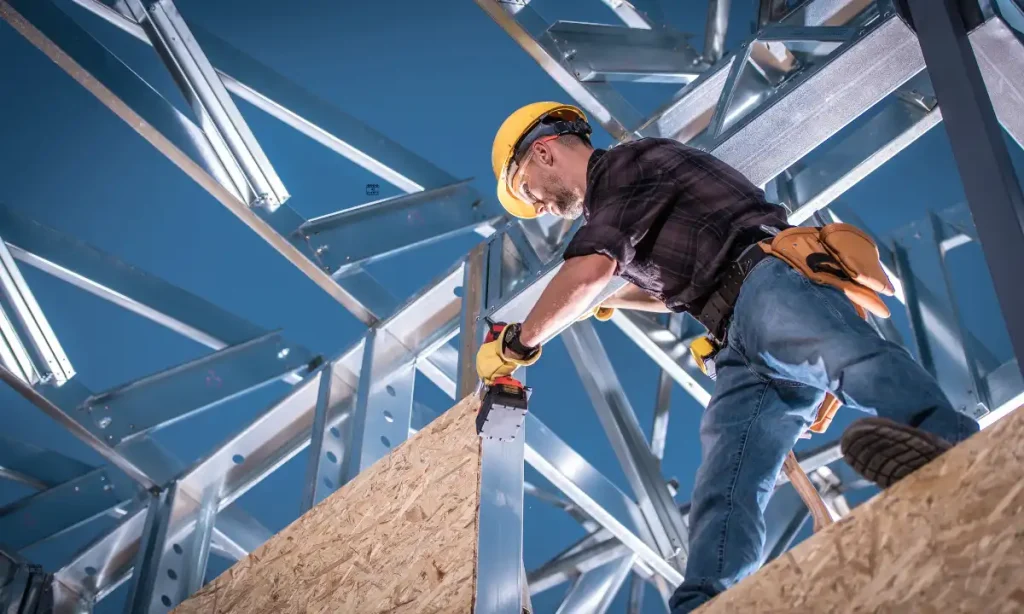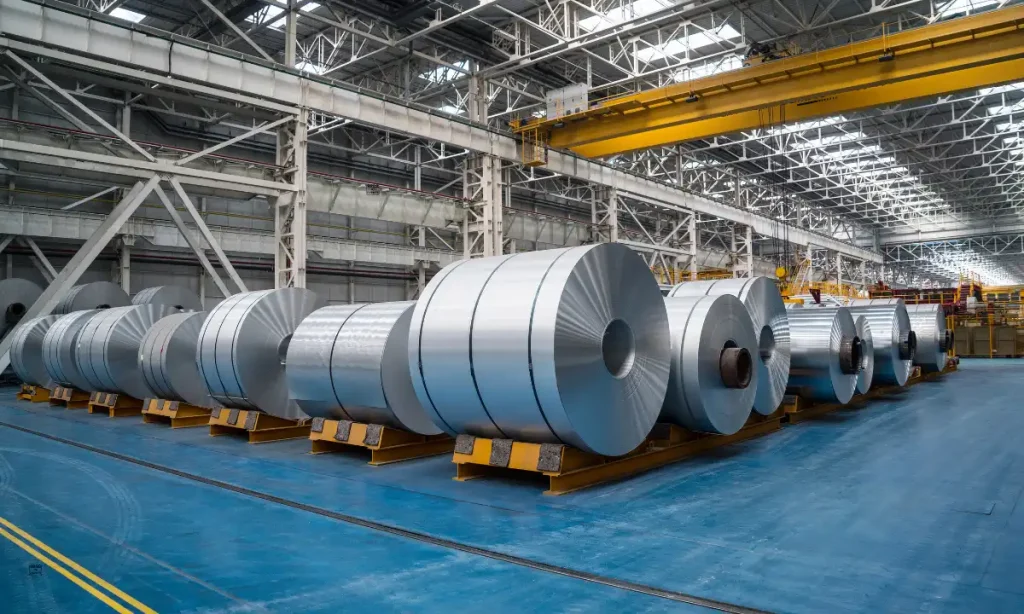Introduction to the Steel Industry in Riyadh
Riyadh, the capital city of Saudi Arabia, is not only known for its rich culture and history but also for its booming construction and industrial sectors. At the heart of these sectors lies the steel industry, which plays a pivotal role in shaping the skyline and infrastructure of the city. Steel is a key component in construction, manufacturing, and various industries, making it an essential commodity for Riyadh’s rapid development.
Importance of Steel in Saudi Arabia’s Economy
The steel industry is vital to Saudi Arabia’s economic growth, particularly in Riyadh, where construction and development projects are continuously underway. Steel is essential in the creation of everything from skyscrapers to industrial machinery.
Riyadh’s infrastructure relies heavily on steel, from bridges to commercial complexes. The material’s durability and strength make it indispensable in creating long-lasting structures that can withstand the harsh climate of the region.
Saudi Arabia’s Vision 2030 aims to diversify the economy, and the steel industry is a key player in this initiative. Major steel companies in Riyadh are driving innovation and expansion to support the goals of creating a sustainable and self-reliant economy.
Also Read: Top Event Companies in Riyadh, Saudi Arabia
Top Steel Companies in Riyadh 2024
Several prominent steel companies operate in Riyadh, each contributing significantly to the industry. Below are the top players in the steel sector:
Saudi Iron & Steel Company (Hadeed)
Hadeed, a subsidiary of Saudi Basic Industries Corporation (SABIC), is one of the largest steel manufacturers in Saudi Arabia. Known for its high-quality products, Hadeed produces a wide range of steel products used in construction, automotive, and industrial applications. With its advanced production techniques and adherence to international quality standards, Hadeed has established itself as a leader in the regional steel market. The company’s focus on sustainability and eco-friendly practices also sets it apart, contributing to the growth of green construction initiatives in Saudi Arabia.
Zamil Steel Holding Company
Zamil Steel is renowned for its expertise in producing pre-engineered steel buildings (PEBs) and structural steel products. With decades of experience, Zamil Steel has built a solid reputation for innovation, reliability, and high production capacity. The company’s products are widely used in commercial and industrial projects across the Middle East and beyond. Their commitment to quality, coupled with state-of-the-art manufacturing facilities, makes them one of the most trusted names in the steel industry. Zamil Steel is also known for its ability to deliver customized steel solutions tailored to meet specific project requirements.
Al-Tuwairqi Group
Al-Tuwairqi Group is a major player in the Middle Eastern steel market, producing a wide variety of steel products for multiple industries, including construction, energy, and transportation. The company’s focus on delivering high-quality steel, coupled with its customer-centric approach, has earned it a reputation as a trusted supplier in Riyadh and the broader Gulf region. Al-Tuwairqi Group also places a strong emphasis on innovation and continuously seeks to enhance its production processes, ensuring it remains competitive in the global steel market.
Rajhi Steel Industries
Rajhi Steel is another top steel company based in Riyadh, well-known for producing a diverse range of high-quality steel products. The company plays a vital role in supplying steel for major infrastructure projects across Saudi Arabia, contributing to the Kingdom’s industrial growth. Rajhi Steel is particularly recognized for its ability to meet the stringent quality requirements of large-scale construction and industrial projects. With a focus on both domestic and international markets, Rajhi Steel continues to expand its operations, ensuring it meets the growing demand for steel products in Saudi Arabia.
Al Yamamah Steel Industries
Al Yamamah Steel is a leading manufacturer of pipes, tubes, and construction steel products in Riyadh. The company’s portfolio includes high-quality electrical conduit pipes, structural steel, and rebar, which are used in various infrastructure projects across the Kingdom. Al Yamamah Steel is known for its consistent delivery of high-quality products, its adherence to international standards, and its ability to meet the growing demands of the local market. The company’s forward-thinking approach has led to the development of innovative steel solutions, further enhancing its reputation in the steel industry.
Al Ittefaq Steel Products Company (ISPC)
Al Ittefaq Steel is one of the most reputable steel producers in Riyadh, known for manufacturing a wide variety of steel products, including rebar, wire rods, and steel sections. ISPC has been instrumental in supporting the construction and industrial sectors in Saudi Arabia. The company is recognized for its modern production facilities, high-quality output, and dedication to sustainable manufacturing practices. By leveraging the latest technologies, Al Ittefaq Steel has established itself as a key player in the region’s steel sector.
National Metal Manufacturing and Casting Company (MAADANIYAH)
MAADANIYAH is a prominent steel and metal manufacturing company based in Riyadh. It specializes in producing various steel products, including steel pipes, wire, and other metal components. MAADANIYAH serves diverse industries, from construction to oil and gas. The company is known for its high-quality products, robust manufacturing processes, and commitment to customer satisfaction. MAADANIYAH’s contribution to the steel industry in Riyadh has helped the city maintain its status as a key hub for steel production in the Middle East.
United Gulf Steel Mill Company (UGS)
UGS is one of Riyadh’s key players in the steel rolling industry, producing high-quality steel billets and bars for various industries. The company is dedicated to meeting the increasing demand for steel products in Saudi Arabia, with a focus on providing efficient, cost-effective solutions for its clients. UGS has invested heavily in modernizing its facilities to maintain a competitive edge in the market. The company’s commitment to innovation and quality has solidified its position as a major supplier of steel products in Riyadh.
Arabian Pipes Company (APC)
Arabian Pipes Company (APC) is a leader in the production of steel pipes, catering primarily to the oil, gas, and water industries in Saudi Arabia and beyond. APC’s products are widely used in large infrastructure and energy projects, reflecting the company’s critical role in supporting the country’s industrial growth. With a focus on delivering high-quality steel pipes and tubes, APC has become a preferred supplier for many major corporations and government projects. The company’s reputation for reliability and quality ensures its ongoing success in the steel industry.
Overview of the Steel Production Process

Understanding the steel production process helps in appreciating the complexities and innovations behind the material that shapes modern infrastructure. Steel, an integral part of construction, automotive, and manufacturing industries, goes through several intricate processes before it reaches its final form.
Raw Material Extraction
The steel production journey begins with the extraction of key raw materials, primarily iron ore, coal, and limestone. These materials are the backbone of steel alloys, carefully sourced from mines across the globe. Iron ore provides the essential iron content, coal is converted into coke (a key fuel in smelting), and limestone acts as a flux, removing impurities during the production process. The quality of these raw materials significantly impacts the properties of the final steel product.
Smelting and Refining
Once the raw materials are gathered, they undergo the smelting process in blast furnaces. In this stage, iron ore is combined with coke and limestone and heated to extreme temperatures, often reaching 2,000°C (3,632°F). This heat breaks down the ore, extracting molten iron. The molten iron still contains several impurities, which are removed during the refining process.
In modern steelmaking, processes like the basic oxygen furnace (BOF) and electric arc furnace (EAF) are used for refining. These methods involve blowing oxygen into molten iron to remove excess carbon and other impurities, converting it into steel. The refining process is crucial for producing different grades of steel, tailored for various industrial applications.
Alloying
During the refining stage, alloying elements such as carbon, manganese, nickel, and chromium are added to the molten steel. Each of these elements imparts specific characteristics to the steel. For example, carbon increases hardness, chromium enhances corrosion resistance, and nickel improves toughness. By carefully controlling the alloy composition, steel manufacturers can produce a wide range of steel products with different properties, from highly durable construction steel to lightweight automotive steel.
Casting
After refining, the molten steel is cast into semi-finished shapes such as billets, blooms, or slabs. This process can be done through continuous casting, where the molten steel is poured into a mold and solidified as it cools. This method is more efficient than traditional ingot casting and allows for precise control over the size and shape of the cast steel.
Rolling and Shaping
Once the steel has been cast into its basic form, it undergoes further processing to achieve the desired final product. In the rolling and shaping stage, the semi-finished steel is heated and passed through a series of rollers to reduce its thickness and shape it into different forms, such as sheets, rods, or beams.
Hot rolling is used for larger, thicker products, while cold rolling is applied to produce thinner, more precise steel products. This stage is vital for determining the structural integrity and surface quality of the steel, ensuring it meets the standards required for its intended application.
Heat Treatment and Surface Finishing
Many steel products undergo heat treatment after rolling, which enhances their mechanical properties. Heat treatment processes such as annealing, quenching, and tempering are used to strengthen steel, improve its hardness, or enhance its ductility, depending on the desired characteristics.
Surface finishing is the final step in steel production. This includes applying coatings, galvanizing (for corrosion resistance), or painting to protect the steel from environmental factors and improve its aesthetic appeal. Finishing processes vary based on the end-use of the steel, whether for construction, automotive, or industrial machinery.
This comprehensive view of the steel production process highlights the complexity involved in transforming raw materials into high-quality steel products. Each step, from extraction to surface finishing, ensures that the steel produced meets the strict quality and performance standards required by various industries across the globe.
The Growing Demand for Steel in Riyadh
Riyadh’s construction and industrial sectors are experiencing a rapid increase in demand for steel. The city’s transformation into a modern metropolis is driving the need for more steel-based infrastructure.
Riyadh is undergoing a massive urban development push, with new commercial, residential, and infrastructure projects requiring vast amounts of steel.
The city’s growing industrial sector is also a major consumer of steel, particularly in the creation of machinery, pipelines, and storage facilities.
Automation is transforming the steel industry, allowing companies to increase production efficiency and reduce costs. In Riyadh, leading steel companies are adopting smart manufacturing techniques, utilizing artificial intelligence (AI) and the Internet of Things (IoT) to streamline operations and minimize errors. These innovations help optimize supply chains and ensure the production process is as efficient as possible, further contributing to the growth of the steel industry.
Government Support for Steel Companies
The Saudi government has been a strong supporter of the steel industry, offering various incentives and policies aimed at boosting local production and reducing dependence on imports.
Through its Vision 2030 initiative, the government is encouraging both local and international investments in the steel sector. New projects, infrastructure developments, and growing industrial needs are attracting significant foreign investment in Riyadh’s steel industry.
The government has introduced policies that support industrial growth, including tax incentives, easier access to raw materials, and investment in research and development. These policies aim to make Riyadh a hub for steel manufacturing in the Middle East.
Future Prospects of the Steel Industry in Riyadh
The future of the steel industry in Riyadh looks promising, driven by ongoing urbanization, industrial expansion, and government-backed projects.
Vision 2030 has ambitious plans for infrastructure development and industrial diversification, and steel will continue to be a key material supporting these efforts. As the city expands and new projects emerge, the demand for high-quality steel will rise, ensuring steady growth for steel companies in Riyadh.
The long-term sustainability of the steel industry will depend on how companies adapt to environmental regulations, technological advancements, and market demands. Steel producers in Riyadh are increasingly adopting eco-friendly practices to ensure they can meet both local and international sustainability standards.
How to Choose a Reliable Steel Supplier in Riyadh
Selecting the right steel supplier is crucial for the success of any project, whether it’s a large infrastructure development or a smaller-scale industrial application.
When choosing a steel supplier in Riyadh, it’s important to consider factors such as the supplier’s production capacity, quality certifications, and the range of products offered. A reliable supplier should be able to meet your project’s specific needs in terms of both quality and delivery timelines.
In addition to the quality of the steel, pricing and customer service are equally important. Look for suppliers that offer competitive pricing without compromising on quality, and ensure they provide excellent customer service, from initial consultation to after-sales support.
Conclusion
Riyadh’s steel industry is thriving, driven by the city’s rapid urbanization and industrial growth. Key players like Hadeed, Zamil Steel, Al-Tuwairqi Group, and Rajhi Steel are at the forefront of this expansion, meeting the demand for high-quality steel products. With government support, innovative technologies, and the ambitious Vision 2030 plan, the future of the steel industry in Riyadh looks promising. For businesses and industries seeking reliable steel suppliers, it’s crucial to consider factors like quality, pricing, and customer service to ensure successful project outcomes.


